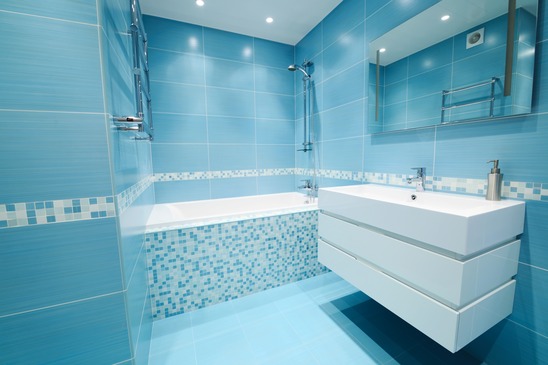Tiles. They are one of the most popular flooring choices around. You can use them anywhere in your home, inside or out, and give each room a clean, rich appeal.
 And while most people know the benefits of using tile simply through use, there may be a few things you never knew about tiles – a few things that may make them the “flooring of choice” as you are considering your flooring options in the future.
And while most people know the benefits of using tile simply through use, there may be a few things you never knew about tiles – a few things that may make them the “flooring of choice” as you are considering your flooring options in the future.
1. Ceramic tiles are an eco-friendly option. Tile is made from clay, natural minerals and water. Because tile doesn’t retain any bacteria, allergens or odors, it’s the perfect choice for a home where a family member suffers from allergies or asthma.
2. Ever wonder why you find so many home kitchens and bathrooms with tiles? Because ceramic tile will not absorb moisture. When you spill liquids, no need to worry – just wipe up and know your tiles will retain their look and feel. Also, the humidity in bathrooms will never impact your tiling – allowing it to retain its natural beauty from year to year.
3. Ceramic tiles are a mixture of different clays pressed into shapes, then fired at very high temperatures to give them their hardness. They are given a hardness classification as to how much weight and stress they can sustain. Group I tiles are suitable for residential bathrooms with light foot traffic – this is also where wall tiles are placed. Group V tiles are for heavy foot traffic and dam areas, such as food service facilities, exterior locations such as swimming pools, etc. And of course in between – group III tiles – are suitable for most residential installations.
4. Tiles are one of the easiest flooring choices to care for long term. Ceramic tiles resist odor, stains and dirt, and can be wiped up any time with a damp sponge, or for larger spills, a wet mop. Most ordinary household cleaners will work well – or try a natural solution of vinegar and water for a clean and easy clean up anytime.
5. Worried about the dog’s nails, high heels walking across the floor, or your kids pulling their favorite toys, and what that will do to the appearance of your tiles? Stick with a Group III or Group IV tile and you’ll experience a tile very resistant to scratches and scuff marks.
6. To be a true ceramic tile, a tile must be made from clay or other nonmetallic minerals and fired or baked above red heat – at least 1800 degrees Fahrenheit.
7. Tiles come in all characteristics, durability and costs.
- Cement tiles are usually low cost, high durability with low to medium maintenance.
- Stone tiles are available at costs from low to high, have a medium to high durability factor, and require a medium to high level of maintenance, depending on type and where installed.
- Porcelain tiles are at the more expensive end of the spectrum, have a high durability factor, and require very low maintenance once installed.
- Glazed tiles are available at all price ranges, which means their durability and maintenance changes depending on the type of type selected.

For all of your Denver Hardwood Flooring needs visit our site today.
 Once your
Once your  Many homeowners are turning to hardwood for its beauty, as well as its durability. It is easy to take care of and easy to install. There are several different methods of installation that can be used. The method you choose should be based on your personal preference.
Many homeowners are turning to hardwood for its beauty, as well as its durability. It is easy to take care of and easy to install. There are several different methods of installation that can be used. The method you choose should be based on your personal preference.